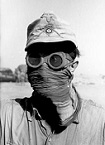SigUp
Posts: 1062
Joined: 11/29/2012
Status: offline

|
quote:
ORIGINAL: Flaviusx
Soviet late war Maskirovka was capable of suckering anybody, not just Hitler.
Richard Gehlen? Nobody was more surprised than he by Bagration. All that German tactical acumen doesn't amount to a hill of beans when the Soviets sucker punch you at the operational and even strategic level as they did more and more frequently as the war went on. Quite simply, they didn't know what the Soviets were up to and the Soviets got the drop on them.
Well, this view is slightly too simplistic. Gehlen and his men did anticipate an attack against AGC, but they were treating this possibility as a sideshow. He was fixed on the idea of an assault out of the Kovel area. The Germans main fear in the Summer of 1944 was a Soviet drive from Kovel to Warsaw and then along the Vistula to the Baltic Sea, cutting off both AGN and AGC. Considering the distance, not an unreasonable suggestion and seeing the ease with which Konev in July managed to destroy the German front in this area one can say that the Red Army missed a big chance for ending the war in 1944 when they chose to attack in Belorussia.
As for the Maskirovka, it did not fool the German army commands. The Germans may have underestimated the scope of the attack, due to the lack of deep-penetrating aerial reconnaissance (by 1944 it was largely gone due to weakness of the Luftwaffe, as well as fuel shortage), leading to them not picking up the troops far behind the frontlines. But they nevertheless had a good idea of what was coming. In the weeks prior to the launch of Bagration all armies of AGC (3rd Panzer, 4th, 2nd and 9th Army) picked up signs for an impending attack and even guessed the objectives in each area correct. For example von Trescow and the staff of 2nd Army predicted a Soviet assault from Vitebsk and Bobruisk with the target of a linkup at Minsk. As for the date, they were predicting 22nd June with 100% certainty, due to the obvious attractiveness of that date. The armies were bombarding army group command with warnings and that's where the holdup of the information happened. Busch simply refused to acknowledge such warnings, or pass up this information up the chain of command to Hitler. He probably was still acting under the impression of the harsh rebuke suffered at the hands of Hitler, when he approached him with the suggestion of a partial retreat in April 1944 and avoided anything that may have upset the mood of the Führer.
EDIT:
quote:
First off German losses for the most part seem very close to history alot of of the time 500k+ going into december. So people claiming the German casualties are to low in the border battles seems off. The border battles for the most part were historically a cake walk for the German Army. They had surprise, planning, and a logistical build up all in place. The Soviets were completely disorganized, and drove straight into their deaths for the most part trying to counterattack the German army initially. Only in a few locations was the Soviet defense stubborn and effective- effective being the key work.
I don't know where you got this information from, but this is blatently wrong. German bloody losses from June 1941 to March 1942 were highest in the months of July and August. In July the Ostheer suffered 164.988 dead, wounded or captured and in August 189.813. For the rest of the time the losses were 131.687 in September, 113.762 in October, 84.051 in November, 77.093 in December, 87.182 in January, 88.014 in February and 105.042 in March. So, these 500.000 is way off. Just counting the bloody losses, the Germans already lost 725.359 through November. If you count the people who had to leave the combat area due to sickness for example, the loss figure rises to 1.026.251 men through November.
< Message edited by SigUp -- 9/8/2013 8:01:54 PM >
|
 Printable Version
Printable Version







 However, in that game my opponent just retreated, retreated, retreated. He gave up everything without a fight. Even Leningrad was barely defended. The slightest threat of a pocket was answered with a full retreat of the entire front. It was a perfect example of a Soviet player preserving his troops and simply waiting for the blizzard. I believe in the entire game there was only one counterattack on turn 16. Not much fun but very effective.
However, in that game my opponent just retreated, retreated, retreated. He gave up everything without a fight. Even Leningrad was barely defended. The slightest threat of a pocket was answered with a full retreat of the entire front. It was a perfect example of a Soviet player preserving his troops and simply waiting for the blizzard. I believe in the entire game there was only one counterattack on turn 16. Not much fun but very effective.






 New Messages
New Messages No New Messages
No New Messages Hot Topic w/ New Messages
Hot Topic w/ New Messages Hot Topic w/o New Messages
Hot Topic w/o New Messages Locked w/ New Messages
Locked w/ New Messages Locked w/o New Messages
Locked w/o New Messages Post New Thread
Post New Thread